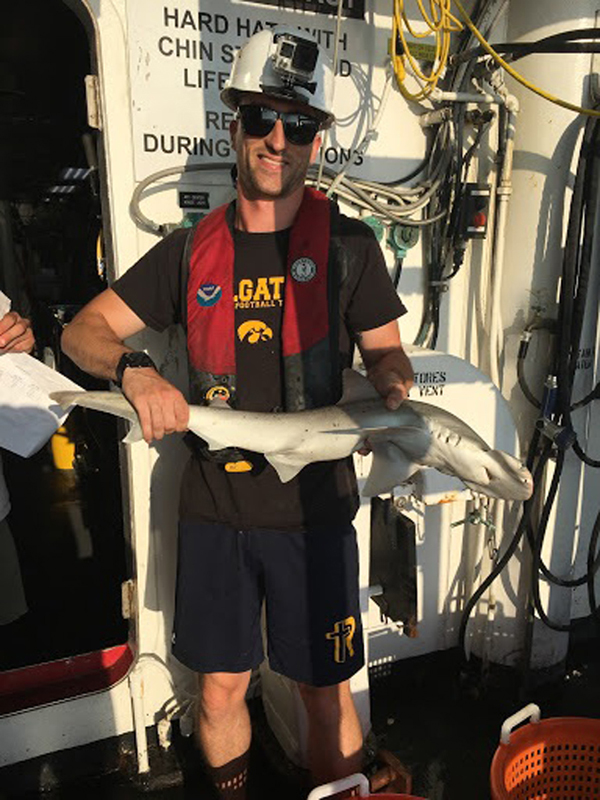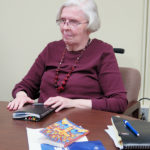By Lindsay Steele
The Catholic Messenger
Chris Murdock, a science teacher and coach at Regina Education Center in Iowa City, spent two weeks of his summer break at sea.
As part of the National Oceanic and Atmospheric Administration (NOAA) Teacher at Sea program June 6-20, 2017, he conducted stock assessments of shrimp and fish species in the Gulf of Mexico.

Chris Murdock, a teacher and coach at Regina Catholic Education Center in Iowa City, poses for a picture with a large fish during the National Oceanic and Atmospheric Administration (NOAA) Teacher at Sea program last summer in the Gulf of Mexico.
To be selected for the program, Murdock, 28, submitted an extensive application that included essay questions, sample lesson plans and how he saw himself implementing the material he learned while on the trip.
He spent most of his time aboard the NOAA ship Oregon II conducting stock assessment on the three main commercial shrimp species off the Texas coast. The trip started near Brownsville and ended just off the coast of Galveston.
“We were specifically looking at the size, sex and quantity of shrimp species at random locations along our path to better help guide the commercial shrimping industry in sustainable fishing methods,” Murdock said.
The group dropped trawl nets behind the boat to conduct research. They generally caught more than just shrimp. “We pulled up a very diverse by-catch along with the shrimp. Some hauls would include over 50 different species of fish.”
Murdock assessed the bi-catch as well. “Various species collected were previously marked as of interest by scientists on land, so we would take more detailed information on them and save specimens for further examination.”
Another of his primary responsibilities was to conduct water testing using a CTD (Conductivity, Temperature, Depth) machine that measures each of those three variables, but also shows scientists the dissolved oxygen (DO) content in that particular area. Without proper levels of DO, life cannot flourish in that location. The group, through this work, will help NOAA better understand the Gulf of Mexico ecosystem. “The Gulf shrimping industry is one of the largest in America, and anything negatively impacting the Gulf has far-reaching consequences,” Murdock explained.
One of the main concerns affecting the Gulf is the “Dead Zone,” an area where the DO levels are lower than 2 parts per million and thus not sustainable for life. “The summer groundfish study unfortunately discovered this year that this area has grown from last season,” Murdock lamented.
He said his experience in the Teacher at Sea program was life changing. “I was able to live out my dream of conducting real scientific field research with one of the largest scientific agencies in the country.”
As the summer ended, he looked forward to sharing his experiences with his biology, anatomy and biomedical sciences students at Regina. “I am now able to bring experiential information that expands beyond the confines of the classroom and into the real world. My students will be exposed to research, career paths and wildlife that many students in Iowa and the Midwest as a whole may never get the opportunity to see.”
He has used his NOAA experience to spread awareness about sustainability and how everyone can play a part in increasing the Regina community’s awareness of the vital role their actions have on the Gulf of Mexico’s health. This spring, the fisheries biologist that Murdock worked with while aboard Oregon II, Andre Debose, will fly up from NOAA’s Mississippi laboratory to speak with students at Regina. He will talk about the scientific research being done, as well as what potential future career paths students can explore in the areas of marine science.
Around the time of Debose’s visit, Murdock plans to teach lessons specific to the research he conducted. Students will learn about the “Texas Closure” in the shrimping industry, and why placing quotas on certain species of marine animals is essential to the long-lasting health of that organism. “We will also be learning about the Gulf’s ‘Dead Zone’ and how states as far up north as Iowa can have a direct impact on the size of it.”
Murdock said he is grateful to the NOAA’s Teacher at Sea Program and the entire crew of the Oregon II “for all they have provided for me.”











